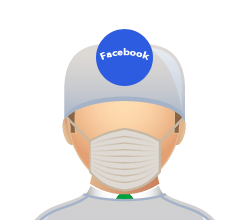New research and treatment has made many cancers that were previously terminal now chronic. Patients live with the condition and daily go about their lives. But often, they do have to manage their cancer and often they worry about reoccurrence, side effects from medication and progression of the disease.
New research and treatment has made many cancers that were previously terminal now chronic. Patients live with the condition and daily go about their lives. But often, they do have to manage their cancer and often they worry about reoccurrence, side effects from medication and progression of the disease.
The chronic patient is often “forgotten”. They are under treatment, doing (fairly) well, and doctors and the media are focusing on the more urgent issue of treating the acute or advanced cancer patient.
Chronic cancer patients want to know and understand their disease. They would like a cure and they seek out the newest and latest information online looking for answers on treatment options, and how to best live with their disease.
Where can chronic cancer patients go for help online?
There are numerous sites for help with living with chronic cancer. Many are disease-specific, offering news about new treatments or research. There are several good video channels that offer interviews with cancer specialists about treatments, clinical trials or other information on specific cancers. There are patient support networks and numerous Facebook pages that offer patients the opportunity to connect with other patients and post discussions about all aspects of their disease.
There is an overwhelming amount of information online and often, it is difficult to sift through all of it.
I have listed a few of these sites below. In no way is this a comprehensive list, but I have asked several cancer patients and opinion leaders for their input and have added their thoughts to the list.
Resources for Chronic Cancer Patients
Institute for Myeloma and Bone Cancer Research
International Myeloma Foundation
Facebook groups
Polycythemia Vera & Budd-chiari Syndrome Awareness
Patient Opinion Leaders and Advocates
Another great way to obtain information on chronic cancers is to follow patient opinion leaders (POLs) on social media channels. These patients have been living with their specific cancer (or cancers) for some time and have spoken about their experience (often publically), written books and articles about it, formed groups or even organizations or companies around chronic cancer. They have Facebook pages, tweetchats, blogs, video programs and websites. They organize patient meetings, interviews with physician specialists and events around their illness. They have the experience and know-how to conduct excellent informational programs for other patients; they are a wonderful source of information.

Andrew Schorr, @Andrew Schorr, founder of PatientPower and author of the Web Savvy Patient has been in remission from Chronic Lymphocytic Leukemia since 2001. In 2012, he was diagnosed with a second cancer, myelofibrosis. Andrew now leads a normal life, thanks to a new targeted oral therapy. He has been a leader in patient education since 1984 and is considered to be one of the most respected and reputable Patient Opinion Leaders.
When I asked Andrew why he did what he did, he responded,
“I feel a responsibility to try to help other patients do better because of something I’ve learned through my experience. While others might wish to protect their privacy I “go public” with the hope to ease the journey of other cancer patients like myself. It helps me feel I am doing something significant and helps all of us know we are not alone, but rather a real community.”
Patient Advocates also help other patients by coaching them through living well and coping with their disease. They use social media to spread the word about their illness and educate patients around the world.

I also spoke with Cindy Chmielewski, @MyelomaTeacher, a former elementary school teacher and a multiple myeloma patient that is now a patient advocate for the disease. Cindy is on the Board of Directors of the Philadelphia Multiple Myeloma Support where she is in charge of the Patient Education Library and Patient Advocacy. – She speaks at support groups, tweets about myeloma, and participates in several online support communities.
When asked why she did what she did, Cindy answered,
“Everyone needs a purpose in life. Being a teacher for 28 years before my medical retirement I knew my purpose in life was to be a facilitator of information. When I regained my strength after my Stem Cell Transplant opportunities began to fall into my lap. I had some very good mentors when I was newly diagnosed. I am very grateful that I able to pay it forward. Sharing what I learn gives my cancer experience a purpose. Using social media allows me to reach a larger audience. I am still a teacher, but now I teach a new subject with different students. We are all in this together and we can gain strength from one another. My life once again has meaning”.
The Power of Social Media
Social media has drastically changed the idea of patient empowerment. Patients all over the world can connect, educate themselves and their family members, network, and instruct and educate others. And they are doing just that. The day of the passive patient is over: Welcome, empowered patient!

Patient Power!






